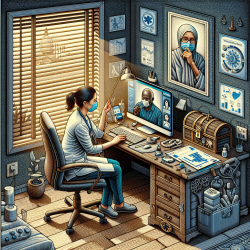The COVID-19 pandemic has significantly impacted healthcare systems worldwide, with general practitioners (GPs) facing unique challenges in maintaining continuity of care for their patients. A recent observational study conducted in France provides valuable insights into how GPs can improve their practice during such unprecedented times. This blog explores the key findings of the study and offers practical advice for GPs looking to enhance their patient care strategies.
The Challenge of Continuity of Care During Lockdowns
During the first COVID-19 lockdown in France (March 17 to May 10, 2020), there was a marked decrease in healthcare service utilization. This raised concerns about the continuity of care, particularly for vulnerable patients who rely heavily on regular medical attention. The study aimed to identify factors that influenced GPs' ability to contact and support these patients during the lockdown.
Key Findings from the Study
- Proactive Initiatives: Approximately 74% of surveyed GPs reported taking initiatives to contact patients during the lockdown. These initiatives were often based on a mix of clinical, psychological, and social criteria.
- Gender and Teaching Influence: Female GPs and those involved in teaching were more likely to use criteria-based strategies to identify and contact vulnerable patients.
- Practice Type Matters: GPs working in multidisciplinary practices were more likely to implement structured strategies for patient contact compared to those working alone.
- Collaboration is Key: Many GPs relied on informal networks with other healthcare professionals, such as nurses and pharmacists, to identify and reach out to vulnerable patients.
Strategies for Improving Patient Care
The findings from this study highlight several strategies that GPs can adopt to enhance patient care during lockdowns:
- Develop Criteria-Based Strategies: Establish clear criteria for identifying vulnerable patients who may require additional support during lockdowns. Consider factors such as age, chronic conditions, social isolation, and mental health.
- Embrace Multidisciplinary Collaboration: Work closely with other healthcare professionals to share information and resources. This collaborative approach can help ensure comprehensive care for patients.
- Utilize Technology: Leverage telehealth platforms and digital communication tools to maintain contact with patients. Regular check-ins via phone or video calls can help monitor patient well-being and address any emerging health concerns.
- Engage in Continuous Learning: Stay informed about best practices and emerging research through webinars, conferences, and publications. This knowledge can guide your approach to patient care during challenging times.
The Role of Telehealth in Continuity of Care
The pandemic has accelerated the adoption of telehealth services, providing an effective means for GPs to continue caring for their patients remotely. By integrating telehealth into their practice, GPs can offer consultations, monitor chronic conditions, and provide mental health support without requiring physical visits.
A Call to Action for General Practitioners
This study underscores the importance of proactive measures and collaboration in ensuring continuity of care during lockdowns. By adopting these strategies, GPs can better support their patients' health and well-being even in challenging circumstances.
To read the original research paper, please follow this link: The challenge for general practitioners to keep in touch with vulnerable patients during the COVID-19 lockdown: an observational study in France.










